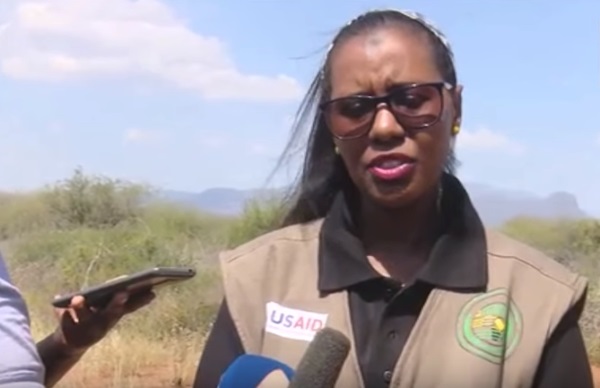It is a long, hard and bumpy drive to West Pokot County in Western Kenya. It takes us almost 3 hours to drive a distance of about 35km from Kapenguria town to Kongerai Division in Kachembari because of the rocky terrane. As we approached Kongerai, we realized it was a market day, for the pastoral community here it is a day to trade in cattle and other livestock like goats and sheep. The people of West Pokot share a border with Uganda’s Karamoja Sub-region, have a section of their ethnic community living in Ugandan district of Amudat and Moroto. But this vibrant community on a market day was not there by choice. Circumstances were forcing them to get rid of their prized livestock. “They sell the cows because of hunger some for school fees and others to treat malaria.”
Some desperate to make a sell turn to unconventional strategies to attract buyers. Drought is these areas is a threat to food security. Some of the pastoralists in Kongerai have resorted to rearing camels which can withstand hard condition. The scarcity of water in this part of the country has also led to human sharing water sources with animals raising the risk of disease. Since 2011, the Inter-Governmental Authority on Development IGAD has been trying to help such communities vulnerable to drought in the 8 member states including Uganda, Kenya, Somalia and Djibouti more resilient. “IGAD together with her member states managed to mobilize over half a billion dollar for this kind of resilience activity that you are now witnessing in West Pokot now. The idea behind IGAD development is also to bring every parent countries of Uganda and Kenya specifically in this cross-border area of Karamoja to cooperate and share resources whenever possible in a peaceful and sustainable manner.” Said, Dr. Ayan Mahmoud – Senior Programme Coordinator, IGAD.
Now communities from both Uganda and Kenya in the Karamoja Sub-region also known as the Karamoja cluster are getting empowered with new ways they can improve pasture for their animals and secure their own food. Right now, we are in Konyau in West Pokot County and the main activity that usually takes place here is bush clearing as you can see the grassland is similar to what you can see in the savannah because this area Semi-arid. Now this grass is usually cut by the locals to allow it to grow and then in the long run it can become pasture and food for their animals. “So as you can see around, we have not cleared all the trees there are some that have been left. And the aim is once we do the clearing then of course this will now allow natural pastures to regenerate and probably where this is not possible, then we introduce some pasture seeds. So most of what you see here, these are natural pastures. When drought comes or sets in, you will hardly hear that Pokots have lost their animals simply because they always move with the animals to Uganda. And because of that good relationship it is really helping our farmers.” Said, Andrew Kaptalai, Country Project Team Leader West Pokot. Work is also going on to construct water plants to aid in the conservation and storage of water in some parts of West Pokot especially near the Uganda – Kenya border.

